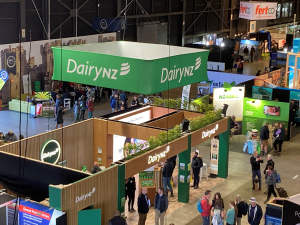DairyNZ opens applications for associate director role
DairyNZ is giving New Zealand farmers a unique opportunity to gain hands-on governance and leadership experience within the dairy sector.
 DairyNZ launched a new resource at National Fieldays, to help farmers better understand the current economic environment.
DairyNZ launched a new resource at National Fieldays, to help farmers better understand the current economic environment.
Farmers are facing increased costs and are focused on managing these at the start of the new dairy season.
To support farmers, DairyNZ launched a new resource at National Fieldays, to help them better understand the current economic environment.
“Every farm is different but, given the scale of cost increases in the past few seasons, many farms will be feeling the current profit squeeze,” explains DairyNZ chief executive Tim Mackle.
“They will likely be starting the season with inflation, farm costs and milk prices front of mind, and considering how to approach the year ahead.”
DairyNZ’s data has shown that, on average, farm costs increased by around 13% between the past two seasons (2021/22 and 2022/23) and around 33% over the past three years. However, costs are forecast to reduce from around $9.17 kg/MS last season to around $8.96 kg/MS for the 2023/24 season.
“It is good to be seeing a slight reduction in farm expenses, particularly for urea and supplementary feed, but costs are still high. We are hearing from farmers that on-farm inflation is one of the biggest concerns impacting their profitability, as they have experienced significant price increases in the past year,” says Mackle.
“That’s why we are focused on supporting our farmers through current market conditions. We are excited to launch our new DairyNZ Econ Tracker to farmers, which provides some of the latest information on the New Zealand dairy sector, including farm economics.
“This is a central platform where farmers can gain information to help understand their operating environment, track sector trends, and then apply the information to their individual farm businesses.
The DairyNZ Econ Tracker builds on the available information from the DairyNZ Economic Survey and Dairy Statistics and provides a snapshot of the dairy sector’s economic situation.
Reflecting on the past year, Horticulture New Zealand chief executive Kate Scott says there has been a lot to celebrate.
Ministry for Primary Industries (MPI) Director General Ray Smith is giving a big shout-out to the horticulture sector, especially kiwifruit.
Early forecasts for New Zealand's apples and pears point to a standout season marked by exceptional fruit quality and high pack-out rates.
Tickets are now available for Beef + Lamb New Zealand’s (B+LNZ) Out the Gate, returning from 19-21 May 2026 at Te Pae, Christchurch.
Dairy Women's Network (DWN) is welcoming AgriHealth as a new partner.
Northland Field Days patron Ross Newlove remembers the inaugural field days he attended 40 years ago.

OPINION: Here w go: the election date is set for November 7 and the politicians are out of the gate…
OPINION: ECan data was released a few days ago showing Canterbury farmers have made “giant strides on environmental performance”.